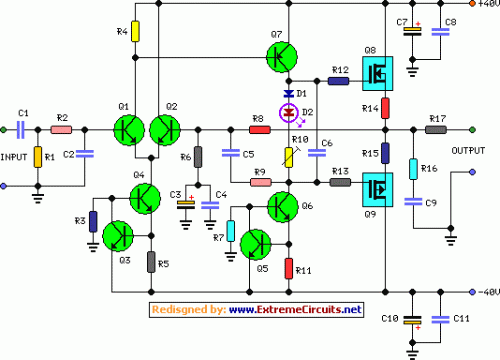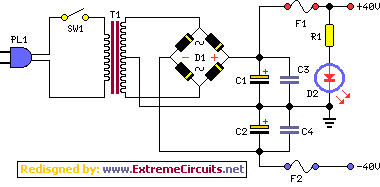FREE
circuits!
How to build 60 Watt Audio Power Amplifier Circuit Diagram
August 5, 2010 - category: Audio amplifierDescription
To celebrate the hundredth design posted to this website, and to fulfil the requests of many correspondents wanting an amplifier more powerful than the 25W MosFet, a 60 - 90W High Quality power amplifier design is presented here. Circuit topology is about the same of the above mentioned amplifier, but the extremely rugged IRFP240 and IRFP9240 MosFet devices are used as the output pair, and well renowned high voltage Motorola's transistors are employed in the preceding stages.
The supply rails voltage was kept prudentially at the rather low value of + and - 40V. For those wishing to experiment, the supply rails voltage could be raised to + and - 50V maximum, allowing the amplifier to approach the 100W into 8 Ohm target: enjoy! A matching, discrete components, Modular Preamplifier design is available here: Modular Audio Preamplifier.
Amplifier section:
Parts:
- R1______________47K 1/4W Resistor
- R2_______________4K7 1/4W Resistor
- R3______________22K 1/4W Resistor
- R4_______________1K 1/4W Resistor
- R5,R12,R13_____330R 1/4W Resistors
- R6_______________1K5 1/4W Resistor
- R7______________15K 1/4W Resistor
- R8______________33K 1/4W Resistor
- R9_____________150K 1/4W Resistor
- R10____________500R 1/2W Trimmer Cermet
- R11_____________39R 1/4W Resistor
- R14,R15_________R33 2.5W Resistors
- R16_____________10R 2.5W Resistor
- R17_____________R22 5W Resistor (wirewound)
- C1_____________470nF 63V Polyester Capacitor
- C2_____________470pF 63V Polystyrene or ceramic Capacitor
- C3______________47µF 63V Electrolytic Capacitor
- C4,C8,C9,C11___100nF 63V Polyester Capacitors
- C5______________10pF 63V Polystyrene or ceramic Capacitor
- C6_______________1µF 63V Polyester Capacitor
- C7,C10_________100µF 63V Electrolytic Capacitors
- D1___________1N4002 100V 1A Diode
- D2_____________5mm. Red LED
- Q1,Q2,Q4_____MPSA43 200V 500mA NPN Transistors
- Q3,Q5________BC546 65V 100mA NPN Transistors
- Q6___________MJE340 200V 500mA NPN Transistor
- Q7___________MJE350 200V 500mA PNP Transistor
- Q8___________IRFP240 200V 20A N-Channel Hexfet Transistor
- Q9___________IRFP9240 200V 12A P-Channel Hexfet Transistor
Power supply :
Parts:
- R1_______________3K9 1W Resistor
- C1,C2_________4700µF 63V Electrolytic Capacitors (See Notes)
- C3,C4__________100nF 63V Polyester Capacitors
- D1_____________400V 8A Diode bridge
- D2_____________5mm. Red LED
- F1,F2__________4A Fuses with sockets
- T1_____________230V or 115V Primary, 30+30V Secondary 160VA Mains transformer
- PL1____________Male Mains plug
- SW1____________SPST Mains switch
Notes:
- In the original circuit, a three-diode string was wired in series to R10. Two of these diodes are now replaced by a red LED in order to achieve improved quiescent current stability over a larger temperature range. Thanks to David Edwards of LedeAudio for this suggestion.
- A small, U-shaped heatsink must be fitted to Q6 & Q7.
- Q8 & Q9 must be mounted on large heatsinks.
- Quiescent current can be measured by means of an Avo-meter wired in series to the positive supply rail and no input signal.
- Set the Trimmer R10 to its minimum resistance.
- Power-on the amplifier and adjust R10 to read a current drawing of about 120 - 130mA.
- Wait about 15 minutes, watch if the current is varying and readjust if necessary.
- The value suggested for C1 and C2 in the Power Supply Parts List is the minimum required for a mono amplifier. For optimum performance and in stereo configurations, this value should be increased: 10000µF is a good compromise.
- A correct grounding is very important to eliminate hum and ground loops. Connect to the same point the ground sides of R1, R3, C2, C3 and C4 and the ground input wire. Connect R7 and C7 to C11 to output ground. Then connect separately the input and output grounds to the power supply ground.
Technical data:
- Output power:
- 60 Watt RMS @ 8 Ohm (1KHz sinewave) - 90W RMS @ 4 Ohm
- Sensitivity:
- 1V RMS input for 58W output
- Frequency response:
- 30Hz to 20KHz -1dB
- Total harmonic distortion @ 1KHz:
- 1W 0.003% 10W 0.006% 20W 0.01% 40W 0.013% 60W 0.018%
- Total harmonic distortion @10KHz:
- 1W 0.005% 10W 0.02% 20W 0.03% 40W 0.06% 60W 0.09%
- Unconditionally stable on capacitive loads
circuit from http://www.extremecircuits.net/2010/01/60-watt-audio-power-amplifier-circuit.html




 This category
This category